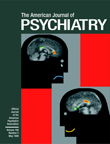Drs. Koenig and George Reply
To the Editor: We are intrigued by Lisa Miller, Ph.D., and colleagues’ recent study examining religiosity and its association with maternal and offspring depression. To summarize, these investigators found that 1) maternal religiosity (degree of religious importance) was protective against maternal depressive disorder and 2) maternal religiosity and mother-offspring concordance of denomination (e.g., both Protestant or both Catholic) were protective against offspring depression—independent of maternal parental bonding, maternal social functioning, and maternal demographics.
While there is mounting evidence from different research teams working at different sites with different populations (1–5) that devout religious beliefs and practices in older adults are associated with lower rates of depression, Dr. Miller and colleagues’ report is the first with children and one of the first concerning middle-aged adults. The rising epidemic of depression in children speaks to the importance and urgency of identifying sociocultural factors responsible for or protective of this trend. The Miller et al. study is also important because it included a large proportion of Catholics (70%), whereas our studies have involved primarily Protestants (more than 80%). Further epidemiologic studies are clearly needed in children, adolescents, young adults, and persons from non-Christian religious backgrounds (e.g., Jews, Moslems, Hindus) to determine to what extent these results can be generalized more broadly.
While religious attendance was not associated with the course or risk of depression in our recent study or in the Miller et al. report, other studies have found it to be one of the most robust inverse predictors of depressive symptoms in nonclinical or community samples (1, 3, 6). Much more work is needed to identify what specific aspect of religiosity—in what setting and in what time of life—is most beneficial in preventing depression or in speeding its remission, particularly since a vast amount of conventional wisdom and clinical experience suggests that certain forms of religiosity may foster depression or act as a barrier to recovery.
1. Kennedy G, Kelman H, Thomas C, Chen J: The relation of religious preference and practice to depressive symptoms among 1,855 older adults. J Gerontol 1996; 51B:P301–P308Google Scholar
2. Pressman P, Lyons JS, Larson DB, Strain JJ: Religious belief, depression, and ambulation status in elderly women with broken hips. Am J Psychiatry 1990; 147:758–760Link, Google Scholar
3. Idler E, Kasl S: Religion among disabled and nondisabled elderly persons: cross-sectional patterns in health practices, social activities, and well-being. J Gerontol 1997; 52B:294–305Google Scholar
4. Braam A, Beekman A, van Tilburg T, Deeg D, van Tilburg W: Religious involvement and depression in older Dutch citizens. Soc Psychiatry Psychiatr Epidemiol 1997; 32:284–291Crossref, Medline, Google Scholar
5. Braam A, Beekman A, Deeg D, Smith J, van Tilburg W: Religiosity as a protective or prognostic factor of depression in later life: results from the community survey in the Netherlands. Acta Psychiatr Scand 1997; 96:199–205Crossref, Medline, Google Scholar
6. Koenig H, Hays J, George L, Blazer D, Larson D, Landerman L: Modeling the cross-sectional relationships between religion, physical health, social support, and depressive symptoms. Am J Geriatric Psychiatry 1997; 5:131–143Crossref, Medline, Google Scholar



